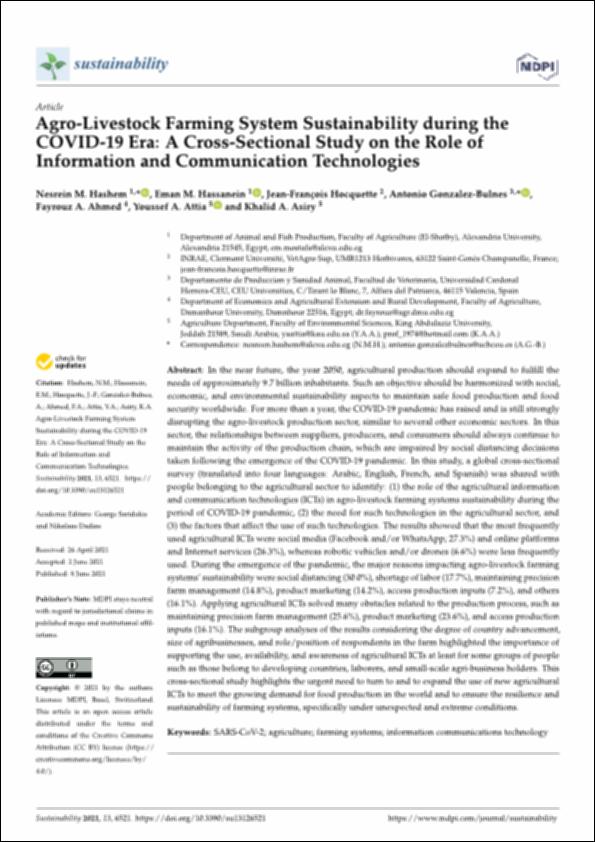Por favor, use este identificador para citar o enlazar este ítem:
http://hdl.handle.net/10637/13561Agro-livestock farming system sustainability during the COVID-19 era : a cross-sectional study on the role of information and communication technologies
| Título : | Agro-livestock farming system sustainability during the COVID-19 era : a cross-sectional study on the role of information and communication technologies |
| Autor : | Hashem, Nesrein M. Hassanein, Eman M. Hocquette, Jean-François González de Bulnes López, Antonio Ahmed, Fayrouz A. Attia, Youssef A. Asiry, Khalid A. |
| Materias: | Agricultura - Tecnología.; Mecanización agrícola.; Farm mechanization.; Explotaciones agrícolas - Innovaciones tecnológicas.; SARS-CoV-2 (Virus); Agriculture innovations.; COVID-19.; COVID-19 (Disease); Farms - Technological innovations. |
| Editorial : | MDPI |
| Citación : | Hashem, N.M., Hassanein, E.M., Hocquette, J.-F., Gonzalez-Bulnes, A., Ahmed, F.A., Attia, Y.A. & Asiry, K.A. (2021). Agro-livestock farming system sustainability during the COVID-19 era: a cross-sectional study on the role of information and communication technologies. Sustainability, vol. 13, i. 12 (08 jun.), art. 6521. DOI: https://doi.org/10.3390/su13126521 |
| Resumen : | In the near future, the year 2050, agricultural production should expand to fulfill the needs of approximately 9.7 billion inhabitants. Such an objective should be harmonized with social, economic, and environmental sustainability aspects to maintain safe food production and food security worldwide. For more than a year, the COVID-19 pandemic has raised and is still strongly disrupting the agro-livestock production sector, similar to several other economic sectors. In this sector, the relationships between suppliers, producers, and consumers should always continue to maintain the activity of the production chain, which are impaired by social distancing decisions taken following the emergence of the COVID-19 pandemic. In this study, a global cross-sectional survey (translated into four languages: Arabic, English, French, and Spanish) was shared with people belonging to the agricultural sector to identify: (1) the role of the agricultural information and communication technologies (ICTs) in agro-livestock farming systems sustainability during the period of COVID-19 pandemic, (2) the need for such technologies in the agricultural sector, and (3) the factors that affect the use of such technologies. The results showed that the most frequently used agricultural ICTs were social media (Facebook and/or WhatsApp; 27.3%) and online platforms and Internet services (26.3%), whereas robotic vehicles and/or drones (6.6%) were less frequently used. During the emergence of the pandemic, the major reasons impacting agro-livestock farming systems’ sustainability were social distancing (30.0%), shortage of labor (17.7%), maintaining precision farm management (14.8%), product marketing (14.2%), access production inputs (7.2%), and others (16.1%). Applying agricultural ICTs solved many obstacles related to the production process, such as maintaining precision farm management (25.6%), product marketing (23.6%), and access production inputs (16.1%). The subgroup analyses of the results considering the degree of country advancement, size of agribusinesses, and role/position of respondents in the farm highlighted the importance of supporting the use, availability, and awareness of agricultural ICTs at least for some groups of people such as those belong to developing countries, laborers, and small-scale agri-business holders. This cross-sectional study highlights the urgent need to turn to and to expand the use of new agricultural ICTs to meet the growing demand for food production in the world and to ensure the resilience and sustainability of farming systems, specifically under unexpected and extreme conditions. |
| Descripción : | Este artículo se encuentra disponible en la siguiente URL: https://www.mdpi.com/2071-1050/13/12/6521 Este artículo pertenece al número especial "Sustainable Management of Agri-Food under COVID-19". |
| URI : | http://hdl.handle.net/10637/13561 |
| Derechos: | http://creativecommons.org/licenses/by/4.0/deed.es |
| ISSN : | 2071-1050 (Electrónico) |
| Fecha de publicación : | 8-jun-2021 |
| Centro : | Universidad Cardenal Herrera-CEU |
| Aparece en las colecciones: | Dpto. Producción y Sanidad Animal, Salud Pública Veterinaria y Ciencia y Tecnología de los Alimentos |
Los ítems de DSpace están protegidos por copyright, con todos los derechos reservados, a menos que se indique lo contrario.


